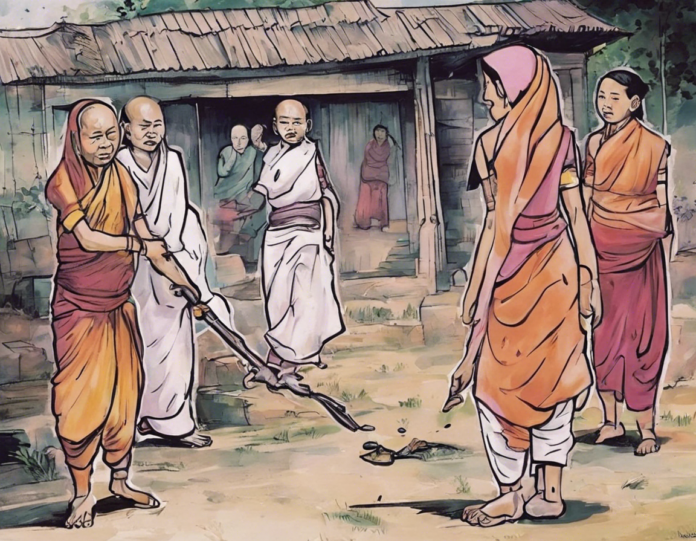On July 10, 2021, an incident in Manipur, India, involving a young girl garnered global attention and sparked debates on various social, legal, and ethical issues. The incident shed light on the prevalent challenges faced by girls and women in various parts of the world. In this article, we will delve deeper into the details of the incident, analyze its implications, and discuss the broader issues it has brought to the forefront.
The Incident
The incident in Manipur involved a 14-year-old girl who was allegedly raped by multiple individuals, including a local politician’s son. The girl, who hails from a marginalized community, was subjected to inhumane treatment, leading to public outrage and demands for justice. The perpetrators not only assaulted her physically but also threatened her with dire consequences if she spoke out about the incident.
Implications
The incident in Manipur highlights several critical issues that warrant immediate attention and action. These include:
1. Gender-Based Violence
The alleged rape of the young girl underscores the pervasive issue of gender-based violence that continues to plague societies worldwide. Women and girls are disproportionately affected by such acts of violence, which not only harm the individual but also perpetuate a culture of fear and silence.
2. Power Dynamics
The involvement of a politician’s son in the incident points to the issue of power dynamics and how individuals in positions of influence often abuse their authority. It raises questions about accountability, impunity, and the need for a fair and just legal system that holds everyone accountable for their actions, regardless of their social status.
3. Marginalization and Vulnerability
The victim’s marginalized background sheds light on the systemic discrimination and vulnerabilities faced by marginalized communities, especially women and girls. Lack of access to resources, education, and support networks further exacerbates their susceptibility to exploitation and abuse.
Legal and Ethical Considerations
The incident in Manipur raises several legal and ethical considerations that are crucial for a just and equitable resolution. These include:
1. Legal Accountability
Ensuring that the perpetrators are held accountable for their actions is paramount in delivering justice to the victim and setting a precedent for deterring future acts of violence. The legal system must act swiftly and decisively to investigate the incident, prosecute the guilty parties, and provide the victim with the necessary support and protection.
2. Ethical Responsibility
Society as a whole has an ethical responsibility to condemn such acts of violence and work towards creating a safe and supportive environment for all individuals, especially the most vulnerable. Addressing the underlying factors that contribute to gender-based violence, such as misogyny, patriarchy, and toxic masculinity, is essential in effecting lasting change.
3. Victim Support
Providing comprehensive support to the victim, including medical care, counseling, legal assistance, and rehabilitation, is crucial in helping her recover from the trauma she has experienced. It is essential to prioritize the victim’s well-being and ensure that she is protected from further harm or retaliation.
Addressing the Root Causes
In addition to seeking justice for the victim and holding the perpetrators accountable, it is essential to address the root causes of gender-based violence and systemic injustice. This involves:
1. Education and Awareness
Promoting gender equality through education and awareness-building initiatives is key to challenging harmful stereotypes, norms, and behaviors that perpetuate violence against women and girls. Empowering individuals with knowledge and resources can help create a more inclusive and respectful society.
2. Policy Reforms
Advocating for policy reforms that protect the rights of women and girls, strengthen legal frameworks, and enhance access to justice is essential in addressing gender-based violence effectively. Supporting initiatives that promote gender equality, social justice, and human rights can bring about lasting change.
3. Community Engagement
Engaging communities in conversations about gender equality, consent, and respect is crucial in fostering a culture of accountability and empathy. Building solidarity and alliances among different groups can create a supportive environment for victims and survivors of gender-based violence.
Frequently Asked Questions (FAQs)
1. What should I do if I suspect someone is experiencing gender-based violence?
If you suspect someone is experiencing gender-based violence, you can offer support, listen to them without judgment, and help them access resources such as helplines, shelters, or counseling services. Encouraging them to seek help from professionals and respecting their decisions are crucial steps in assisting them.
2. How can I contribute to ending gender-based violence in my community?
You can contribute to ending gender-based violence in your community by educating yourself and others about the issue, challenging harmful attitudes and behaviors, supporting survivors, advocating for policy changes, and promoting gender equality and respect for all individuals.
3. What are some warning signs of an abusive relationship?
Some warning signs of an abusive relationship include controlling behavior, jealousy, isolation from friends and family, physical or emotional abuse, threats of violence, and manipulation. It is essential to recognize these signs and seek help if you or someone you know is in an abusive relationship.
4. How can we create a safer environment for women and girls?
Creating a safer environment for women and girls involves addressing systemic issues such as inequality, discrimination, and violence. This includes promoting gender equality, supporting survivors, holding perpetrators accountable, and advocating for policies that protect the rights and dignity of all individuals.
5. What role do men and boys play in ending gender-based violence?
Men and boys play a crucial role in ending gender-based violence by challenging harmful stereotypes, behaviors, and attitudes, promoting consent and respect, supporting survivors, and actively advocating for gender equality. Engaging men and boys as allies in the fight against gender-based violence is essential for creating lasting change.
In conclusion, the incident in Manipur serves as a stark reminder of the urgent need to address gender-based violence, empower marginalized communities, and uphold justice and equality for all individuals. By raising awareness, advocating for policy reforms, supporting victims, and engaging communities, we can work towards creating a society free from violence and discrimination.

